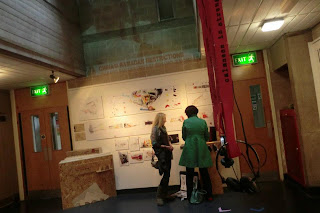Liberty Thompson
Year 4 Interior Environmental Design
Thesis Project – The Tin Ring Experience
Contemporary
Context
It is vital to keep stories from the past alive to
learn from and help future generations. The Tin Ring recites a powerful story
from the Holocaust. We experience
history in museums, exhibitions, books, film/TV and computer games to a certain
extent but as we will never experience this first hand it is difficult to fully
understand in today’s society. This is not to say we don’t know how it feels to
go through adversities and life struggles, however today’s problems are often
extremely different. In The Tin Ring, Zdenka Fantlova describes how her
extraordinary strength and hope encourage her to persevere in the darkest
times.
This thesis aims to enable us to relate to these
parts of history at a deeper level to increase awareness and interest. Research
and development have highlighted the importance of involving all generations of
people, design and technologies to create a spatial experience which allows
young people to learn, elders to remember whilst learn from contemporary design
and technology (including social media, film and audio media, and live feeds
and filming). The visitors are photographed at points throughout the
exhibition, allowing them to become part of the exhibition and creating a
memory bank of ‘history’ for future generations.
The combination of architecture, installation, film
and audio media, interaction and performance come together to create a fully
immersive exhibition. The thesis also questions gallery spaces, as to why they
are designed in standardized ways, and how are exhibition spaces changing? As
design and culture evolve, spaces where these exhibit are too. Exhibition space
design can be as powerful as the exhibition itself, which this project has
explored.
Content
of Project
Based on the book The Tin Ring, by Zdenka Fantlova,
a Jew in WW2. She takes us on an incredible journey on how hope keeps her going
when at deaths door. Through exhibition design, her story is conveyed. To
enable people to understand at a deeper level, the spatial experience focuses
on how in today’s society we can relate to such situations, by comparing to
such in the contemporary world. Combining different aspects of design, from
media to installation, the exhibition enables the visitor to tell their own
story. The fully immersive spaces help us engage and inspire us for our futures
and generations to come.
How
the project relates to my future directions and how can it be applied and
developed?
Creating immersive experiential spaces is my
passion. Film,TV set and exhibition design are the areas I intend to focus my future
career. By developing my skills in concept designing, drawing and developing,
as well as model making, material investigations, filmmaking and editing etc, I
will be able to apply these in the art department whether in researching,
concept drawing, developing and on set. Learning new techniques such as
lazor-cutting, sublimation printing and improving my computer skills is
something to bring the workplaces often less aware of such.
Explanation
of the project to a general audience
The exhibition design is based on the book The Tin
Ring, by Zdenka Fantlova, a Jewish victim in WW2. We follow her story of hope
and strength through the war. The exhibition design tells her story to today’s
world by relating such experiences to such in contemporary life, so we can
learn, be inspired and keep the story alive for future generations.
Site-specific for The Lowry Centre, the design creates a relationship
between the architecture of the space and the exhibition. It queries typical
gallery space design and the ‘how and why’. Combining architecture,
installation, film and audio media, interaction and performance unites the past,
present and future, whilst allowing the visitor to become part of the
experience and tell their own story.
The visitor journeys through Zdenka’s story in six
stages, based on interpretations of The Tin Ring. Upon entering the space you
travel through freedom, restriction,
confinement, deterioration, trapped and saviour
– before entering the inner survival kit
zone and cinema zone – where you
can reflect on your journey in the photobooth.
Finally, the future zone allows visitors
to connect with the world on in a live newsfeed environment. The fully
immersive spaces enable us engage with stories of the past and present whilst
inspiring us for our own futures.















